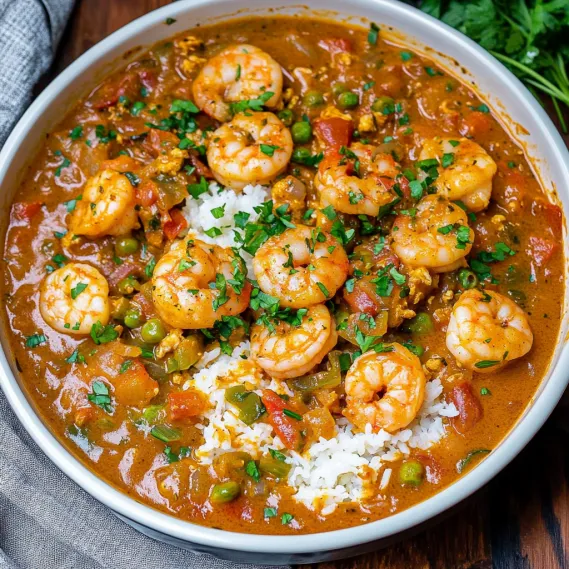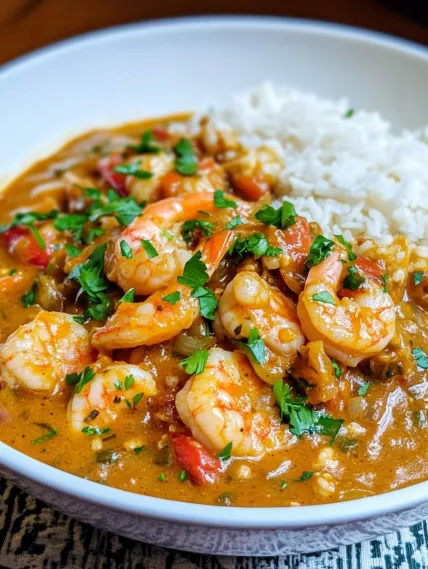 Pin
Pin
This hearty shrimp and crawfish étouffée transforms ordinary seafood into a soul-warming Creole masterpiece that's been my family's favorite for special gatherings and Sunday dinners. The rich, buttery sauce envelops tender seafood and creates the perfect topping for fluffy white rice.
I first learned this recipe from my Louisiana-born grandmother who insisted that a proper roux requires patience and constant attention. Now whenever I make it, my kitchen fills with the same warm aromas that made her house feel like home.
- Crawfish tails: Provide authentic Louisiana flavor and a slightly different texture than shrimp alone
- Medium shrimp: Cook quickly and absorb all the delicious flavors of the sauce
- Holy trinity of onions, bell peppers and celery: Forms the essential flavor base of Creole cooking
- Vegetable oil and flour: Combine to make the all important roux that thickens and flavors the dish
- Seafood stock: Enhances the oceanic flavor but chicken stock works beautifully too
- Butter: Adds richness and creates a silky texture in the final sauce
- Green onions: Add fresh flavor and color contrast
- Parsley: Brightens the dish with fresh herbaceous notes
- Tony Chachere's Creole Seasoning: Delivers authentic flavor without measuring individual spices
- Cooked rice: Serves as the perfect canvas for soaking up the flavorful sauce
Step-by-Step Instructions
- Create the Roux:
- Heat oil in a heavy bottomed skillet until smoking hot then whisk in flour completely. Reduce heat to medium and stir constantly without stopping until the mixture reaches a peanut butter color. This process takes about 10 to 15 minutes of continuous stirring to prevent burning. The roux provides both the thickening power and deep flavor foundation.
- Add Aromatics:
- Turn off heat and stir the holy trinity vegetables and seasonings into the hot roux. Allow the residual heat to cook the vegetables for about 5 minutes. The vegetables will slightly soften and their moisture will help stop the roux from cooking further. This step infuses the vegetables with the rich roux flavor.
- Create Sauce Base:
- Bring stock to a boil in a separate deep pot then whisk in the roux mixture until completely dissolved. Reduce heat and cook until the raw flour taste disappears, stirring occasionally and seasoning to taste. This process takes about 10 minutes of gentle simmering to fully develop the flavors.
- Prepare Seafood:
- Clean your original skillet then melt one stick of butter over medium heat. Add crawfish, shrimp, and green onions, sautéing until shrimp turn pink, about one minute. Add remaining butter and stock, stirring until butter melts completely. This quick cooking preserves the tender texture of the seafood.
- Combine and Simmer:
- Pour the seafood mixture into the stock pot and whisk to combine everything thoroughly. Bring to a boil then reduce to a simmer, stirring occasionally. Cover and cook on low for 30 minutes, stirring periodically and adjusting seasonings. During this time, prepare your rice according to package directions.
- Serve with Love:
- Plate by adding a half cup of rice to each bowl, generously topping with the étouffée and finishing with fresh parsley. The presentation should showcase the seafood and vibrant colors of the dish.

The holy trinity of onions, bell peppers and celery is truly magical in this dish. My grandmother taught me that no proper Creole dish begins without these three ingredients sweating in a pan. The memory of her patiently stirring the roux while telling stories about New Orleans still makes this dish taste like home to me even decades later.
Mastering the Roux
The heart and soul of étouffée lies in a properly made roux. The key is constant attention and the right heat level. If your roux smells burned even slightly, discard it and start over. A perfect roux should smell nutty and rich, never acrid. I recommend using a wooden spoon with a flat edge that can reach the corners of your pot where burning often starts. Developing the deep color takes time but creates incomparable depth of flavor that no shortcuts can replicate.

Ingredient Substitutions
While authentic étouffée traditionally uses crawfish, you can make this with all shrimp if crawfish tails are unavailable. For a more economical version, try using frozen seafood which works surprisingly well. Some home cooks add a tablespoon of tomato paste to their étouffée for color and flavor, though purists might disagree. If you prefer a thinner sauce, simply add more stock during the final simmering. Vegetarians can even adapt this recipe using mushrooms and vegetable stock for a surprisingly satisfying alternative.
Serving Suggestions
Étouffée traditionally accompanies plain white rice, but branch out with Louisiana dirty rice for an extra flavor punch. Warm crusty French bread makes the perfect accompaniment for sopping up every last bit of sauce. For a complete Creole feast, start with a cup of gumbo, follow with the étouffée, and finish with bread pudding for dessert. This dish pairs wonderfully with cold beer or a crisp white wine like Sauvignon Blanc to balance the richness.
Cultural Context
Étouffée, which means smothered in French, represents the beautiful cultural melding that defines Louisiana cuisine. This dish showcases how French cooking techniques combined with local ingredients and African influences to create something uniquely American. Traditionally served during Lent when seafood was permitted while other meats were avoided, étouffée has transcended its seasonal origins to become a year round favorite. Every Louisiana family has their version with subtle differences, making this dish a testament to the deeply personal nature of regional cooking.
Recipe FAQs
- → What is the holy trinity in Creole cooking?
The holy trinity in Creole cooking consists of onions, bell peppers, and celery. These ingredients form the aromatic base of many traditional dishes.
- → Can I use frozen shrimp and crawfish?
Yes, frozen shrimp and crawfish can be used. Just make sure to fully thaw them before cooking to achieve the best texture and flavor.
- → What is a roux and how do I make it?
A roux is a mixture of flour and fat, cooked together to thicken sauces. For this dish, cook flour and oil until it develops a peanut butter color for best results.
- → What should I serve with Shrimp and Crawfish Étouffée?
Shrimp and Crawfish Étouffée is traditionally served over steamed white rice and can be accompanied by crusty French bread or a side of coleslaw.
- → How do I store leftovers?
Allow the étouffée to cool completely, then transfer it to an airtight container and store in the refrigerator for up to 3 days. Reheat gently on the stove or in the microwave.
